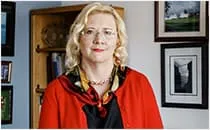2020: Where Is She Now?
Going through the experience of watching her mother get diagnosed and treated for lung cancer led Betty Ferrell to become a missionary in the field of palliative care and pain management. In 2000, she founded the End-of-Life Nursing Education Consortium (ELNEC) project to teach nurses how to deliver effective palliative care.
In 2019, ELNEC celebrated its 20th anniversary. The organization now trains nurses in 100 countries. To date, ELNEC has taught 24,500 trainers, who have gone on to teach palliative care to more than 735,000 providers around the world.
In October 2019, Ferrell was elected as a member of the National Academy of Medicine. This membership is one of the highest honors awarded in the field of health and medicine, recognizing people who have “demonstrated outstanding professional achievement and commitment to service.”
Original Story

Ferrell's experience led her to become a missionary in the fields of palliative care and pain management. In 2000, she founded the End-of-Life Nursing Education Consortium (ELNEC) project to teach nurses how to deliver effective palliative care.
ELNEC now trains nurses in 95 countries, most recently in South Korea and Nepal. The project has also launched a program to support pediatric palliative care in Japan and China. "It is exciting to see this expand to support the care of seriously ill and dying children around the world," Ferrell says.
In the U.S., Ferrell and the National Cancer Institute have teamed up on a new ELNEC project to train oncology nurses in palliative care. ELNEC has also launched an online educational program for undergraduate nursing programs. "This program is vital so that we can prepare nurses to enter practice with the knowledge to care for seriously ill patients," she says.